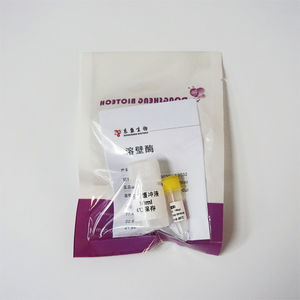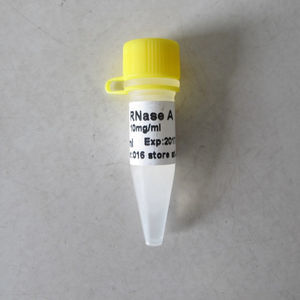
- Laboratory
- Laboratory medicine
- Proteinase K reagent
- Guangzhou Dongsheng Biotech Co., Ltd.

- Products
- Catalogs
- News & Trends
- Exhibitions
Dilution buffer reagent N9016proteaseproteinase Kfor research
Add to favorites
Compare this product
Characteristics
- Type
- dilution buffer, protease, proteinase K
- Applications
- for research, for molecular biology
- Format
- powder
- Tested parameter
- hemoglobin, genomic DNA, potassium, urea
- Other characteristics
- assayed
- Storage temperature
-20 °C, 4 °C
(-4 °F, 39 °F)
Description
Proteinase K is an endolytic protease that cleaves peptide bonds at the carboxylic sides of aliphatic, aromatic or hydrophobic amino acids. The Proteinase K is classified as a serine protease. The smallest peptide to be hydrolyzed by this enzyme is a tetrapeptide.
Features
• Recombinant proteinase K
• Active in a wide range of reaction products
Applications
• Isolation of genomic DNA from cultured cells and tissues
• Removal of DNases and RNases when isolating DNA and RNA from tissues or cell lines
• Determination of enzyme localization
• Improving cloning efficiency of PCR products
Source
From yeast cells with cloned gene encoding genetically engineered Engyodontium album (Tritirachium album) endolytic protease.
Molecular Weight
29.3 kDa monomer.
Definition of Activity Unit
One unit of the enzyme liberates Folin-positive amino acids and peptides corresponding to 1 µmol tyrosine in 1 min at 37°C , pH 7.5 using denatured hemoglobin as substrate.
Enzyme activity is assayed in the following mixture: 0.08 M potassium phosphate (pH 7.5), 5 M urea, 4 mM NaCl, 3 mM CaCl2 and 16.7 mg/ml hemoglobin.
Preparation Instructions
Stock solution can be prepared as 40-80mg/ml in dilution buffer [20 mM Tris-HCl (pH 7.4), 1 mM CaCl2] or [20 mM Tris-HCl (pH 7.4), 1 mM CaCl2, 2% Glycerol], sterilized using 0.22μm filter and supplied at final concentration of 20-40mg/ml in 50% Glycerol.
Inhibition and Inactivation
Inhibitors: Proteinase K is not inactivated by metal chelators, by thiol-reactive reagents or by specific trypsin and chymotrypsin inhibitors. Phenylmethylsulfonyl fluoride and diisopropyl phosphorofluoridate completely inhibit the enzyme.
Other Guangzhou Dongsheng Biotech Co., Ltd. products
In Vitro Diagnostic Products
Related Searches
- Solution reagent kit
- Molecular biology reagent kit
- Research reagent kit
- Protein reagent kit
- Diagnostic reagent kit
- Laboratory reagent kit
- Enzyme reagent kit
- Histology reagent kit
- Reagent medium reagent kit
- Dye reagent
- Buffer solution reagent kit
- PCR reagent kit
- Virus reagent kit
- Tissue reagent kit
- Lyophilized reagent kit
- Nucleic acid reagent kit
- DNA extraction reagent kit
- Electrolyte reagent kit
- DNA polymerase reagent kit
- QPCR reagent kit
*Prices are pre-tax. They exclude delivery charges and customs duties and do not include additional charges for installation or activation options. Prices are indicative only and may vary by country, with changes to the cost of raw materials and exchange rates.




